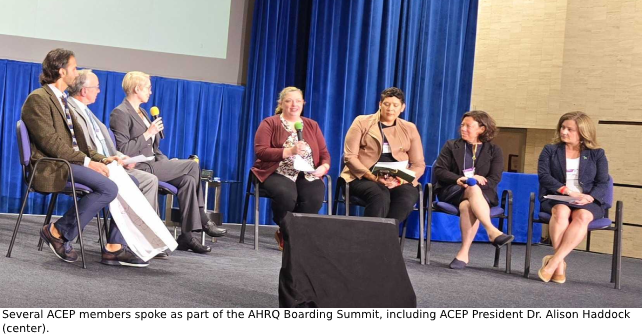
After years of explaining the toll of boarding on patient care and physician well-being, the message finally has landed on ears that can do something about it.
Explore This Issue
ACEP Now: Vol 43 – No 11 – November 2024Thanks to a steady drumbeat of work from ACEP leaders and advocacy staff in Washington, D.C., the Agency for Healthcare Research and Quality (AHRQ) hosted a “Summit to Address Emergency Department Boarding” in October.
This multi-stakeholder, invitation-only event brought together emergency physicians, emergency nurses, hospital leaders, patients, and others for some tough talk about boarding, a national public health crisis.
A recording of the Summit is available on AHRQ’s YouTube channel, and the agency has committed to publishing an actionable report in the coming months.
ACEP proudly uses our wide-ranging influence to work tirelessly with any stakeholder who has a role in crafting solutions to the boarding crisis. We also want to ensure that emergency physicians have a seat at the table for discussions that impact your patients and your practice.

An illustrator at the AHRQ Boarding Summit captured the conversation visually. Click to enlarge each.
ACEP members were well represented at the October Summit in Washington, D.C., both on the stage and in the audience. Featured speakers included:
- Brendan Carr, MD, MA, MS, FACEP, chief executive officer, professor and Kenneth L. Davis, MD, distinguished chair, Mount Sinai Health System, and 2024 winner of ACEP’s Colin C. Rorrie, Jr., PhD Award for Excellence in Health Policy
- Ula Hwang, MD, MPH, FACEP, professor of emergency medicine and population health, medical director of geriatric emergency medicine, New York University Grossman School of Medicine, past member of the ACEP Geriatric Emergency Department Accreditation (GEDA) Board of Directors
- Gabe Kelen, MD, FRCP(C), FACEP, Chair of ACEP’s Board of Directors, professor and chair, Department of Emergency Medicine, Johns Hopkins University
- Brandon Morshedi, MD, DPT, NREMTP, FAEMS, FACEP, emergency medicine and EMS physician, University of Arkansas for Medical Sciences; Global Medical Response
- Jesse M. Pines, MD, MBA, MSCE, FACEP, chief innovation officer at US Acute Care Solutions and 2023 winner of ACEP’s Colin C. Rorrie, Jr., PhD Award for Excellence in Health Policy
- Peter Viccellio, MD, FACEP, professor and vice chairman, Department of Emergency Medicine, associate chief medical officer, Stony Brook University Renaissance School of Medicine, ACEP Councillor
They all underscored the same message: Boarding is a public health crisis, and the best way to address the root causes is through a system-wide, collaborative effort.
Many of the physician speakers confronted misconceptions about the causes of boarding during the Summit and clarified that boarding does not occur because of non-urgent visits. “I’m sorry, I don’t want to hear it. Low-acuity patients have nothing to do with boarding,” Dr. Kelen said. “Build a bigger ED?” he scoffed. “You can’t cure constipation by building more colon.”
Dr. Viccellio discussed how hospitals can adjust the way they work. “These solutions do not require that people work harder. They require that people work differently,” he said.
One way ACEP is creating a path for progress is by working with agencies to strengthen regulatory requirements for hospitals related to boarding.
“Twenty years of data associates boarding with worse outcomes,” said Dr. Pines. “Boarding is a fixable problem, but the incentives aren’t there to fix it. It takes leadership, time, energy, and sustainability.”
You Spoke, The Government Listened
A comprehensive, multi-year advocacy campaign to address the public health crisis of boarding escalated in 2022 with an ACEP letter to the White House that outlined significant concerns about the crisis and urging the President to convene a national summit.
ACEP collected hundreds of your troubling stories to highlight the urgent need for solutions, and we continued to sound the alarm with regulators, policymakers, and media.
In September 2023, ACEP organized and hosted the first National Stakeholder Summit on Boarding to analyze the causes of boarding, discuss barriers to overcome these causes, and identify priority areas to pursue in creating system-wide solutions. Representatives from 15 health care organizations, including the AHRQ, attended.
And during ACEP’s 2023 Leadership and Advocacy Conference (LAC), hundreds of emergency physicians mobilized and took our concerns to Capitol Hill to urge elected officials to act.
ACEP members moved the needle—our advocacy secured the signatures of 44 elected officials on a letter from Congress to the Department of Health and Human Services (HHS), doubling down on the need to convene stakeholders and identify solutions. Just a few months later, HHS announced its plans for what ultimately became the Summit in October.
Emergency physician leadership will be a critical part of any meaningful solution to the boarding crisis, and ACEP is making sure your voice continues to be heard.
“This community is not a bunch of emergency physicians pounding their fists on the table,” Dr. Carr said at the Summit. “These are folks that can see the failed social policy and the chinks in the armor of the health care system and can help you (AHRQ) to find not a magical silver bullet—there is not one—but a matrixed number of incentives and structural changes and transparency that can get us to a place where we have a health care system that we are proud of.”
Pages: 1 2 3 | Multi-Page




No Responses to “AHRQ Summit on Boarding Made Possible by ACEP Advocacy”